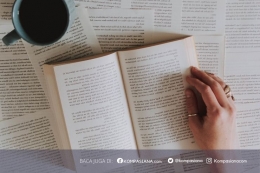Cukup dengan perempuan itu! Aku selalu tidak percaya aku memiliki atasan yang begini. Ok stop, Aku tidak akan memenuhi catatan harian ini dengannya lagi.
Omong-omong dengan penerbitan, kupikir ada yang salah saat para pelaku dunia penerbitan ikut menentukan kepopuleran seorang penulis di media sosial dan jagat maya sebagai salah satu faktor penentu yang penting apakah karyanya layak diterbitkan atau ditolak. Cukup situs berita online sajalah yang terkena efek ini. Tidak perlu para penulis buku terkena efek ini.
Aku mencoba menulis sebuah artikel dalam bahasa Inggris soal itu. Aku kirimkan artikel opini ini ke WhatsUpJakarta.com, portal berbahasa Inggris di sini. Kuharap akan bisa ditayangkan.
Jonathan Franzen: Literary World (Publishers, Writers, Readers) Now Gets Too Obsessed with Twitter
What? You can't get your work published when you have only a meager number of Twitter followers? Or even worse, you don't tweet at all? Or the worst of all, you have no Twitter account and have got no idea why it matters and why publishers bother when they find a writer has no social media presence?
Jonathan Franzen, as some sites reported, criticizes once again the bad effects of social media on the world of literature. This time he lashed out on BBC Radio 4's Today program.
It's a bitter-sweet, love-hate, ambivalent relationship actually. In terms of marketing, of course Twitter has its own power we can't underestimate. Twitter, along with Facebook, may be seen as a free-of-charge promotion tool any writers these days must not miss. I agree on this, to some extent.
In the country where I live, a writer made money by social media even and it is okay. He is young and hilariously talented at storytelling. So he tweets quite a lot and write a lot too. Though I have to admit, his works are not as 'serious and canonical' as Franzen's but he writes and thus a writer he is.
Raditya Dika, the author, seems to have a lot more talens than an author. He is recently widely known for his being a witty comic at a standup comedy regularly aired on a national TV station. And he has been followed by more than 1 million Twitterers. He's not pretty, he's just not that tall, not to mention charming but he's funny and chatty and somehow almost all people like him. Dika would be the best example of the harmonious relationship between writing and social media.
Elizabeth Gilbert has another stance regarding this issue. She once said social media is a neutral entity, so it is neither positive nor negative. It's just a powerful resource of modern technology and humans give it meaning: positive and negative. Gilbert told audience of a talkshow how she found social media (she has been recently actively campaigning on YouTube, Facebook and Twitter along with a lovely site of her own). She doesn't try put all the blame on social media. It is just a tool, for God's sake.
She even highllighted how lucky she has been when she can build a sincere and warm interaction through it with many of her readers, something she cannot do after she turned so incredibly famous and filthy rich. Reaching audience suddenly is easier and more effortless though she knew she cannot retain the intimacy level of exchanging Christmas cards and face-to-face talks with each reader like a long time ago when she was 'no one', a hardly famed author. Now, she is so famous she has lost all this. And social media gives her an outlet, to at the very least rehash that past in an instant fashion.







